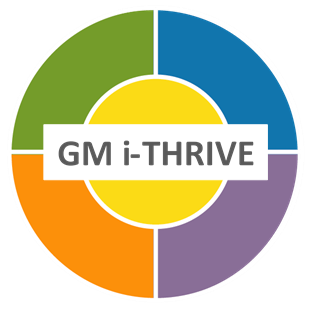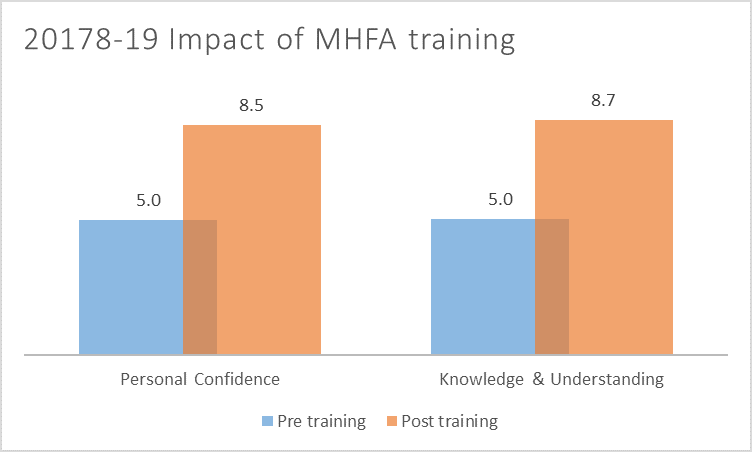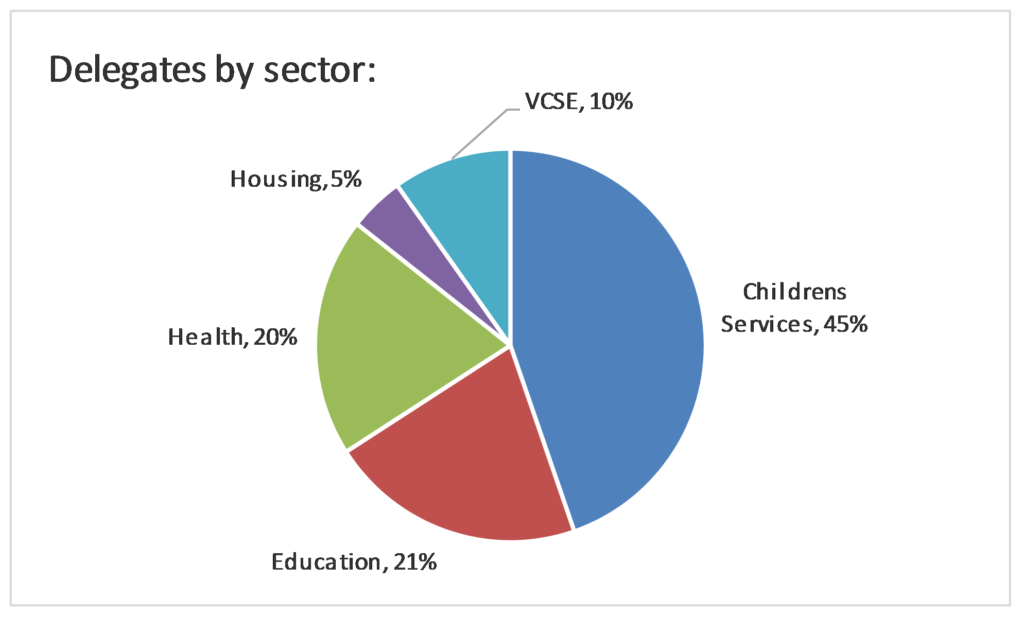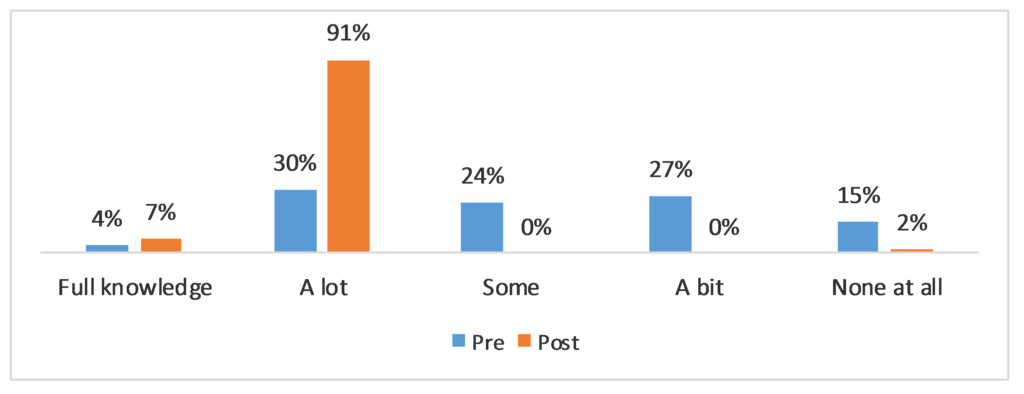
The Greater Manchester (GM) i-THRIVE Programme team spoke with Jane Roberts from Salford Clinical Commissioning Group (CCG) about Salford’s Emotional Health Workforce Training Programme and strategy. It is an example of how a locality can develop a bespoke training strategy to build capacity in the children and young people’s (CYP) workforce.
Download this implementation story.
What was the problem you were trying to solve?
Salford’s Emotional Health and Wellbeing Workforce training programme was developed in response to a workforce audit undertaken in 2016. This audit assessed mental health awareness amongst Salford’s CYP workforce. Gaps in skill and knowledge were identified in 4 different areas:
- Understanding mental health
- Suicide awareness
- LGBTQ+ awareness
- Understanding Adverse Childhood Experiences (ACEs) / Trauma
Simultaneously, a report published by the Proud Trust about the experiences and needs of LGBTQ+ young people in Salford, recommended the need for specific LGBTQ+ training for professionals working with young people, helping staff to attend to their use of language, and the damaging impact of stigmatisation and stereotypical assumptions on this population.
The training programme is open to anyone working or volunteering with a Salford child or young person, and is widely promoted via the Salford EHWB training webpage and the Salford Safeguarding Children Partnership via email bulletins and webpages.
Training programme overview
When building the training strategy, the need for a sustainable, long term, and cost effective training programme was emphasised. The following models were proposed:
- Understanding mental health – Youth Mental Health First Aid (MHFA):
A ‘train the trainer’ approach, with 6 members of staff completing the MHFA Instructor course; 2x Health Improvement Service staff, 2x Integrated Youth Support Service (IYSS) staff funded via the Emotional Health and Wellbeing (EHWB) training fund. In addition, the Whole School Safeguarding Team funded 2x members of the team, with the specific remit of delivering MHFA to schools. Investment to extend the national training programme ensures that MHFA is properly embedded across children and young people’s provision in Salford.
Delivery
- Youth Mental Health First Aid – half-day course, introductory three hour session to raise awareness of young people’s mental health
- Youth Mental Health First Aid Champion – 1 day course
- Youth Mental Health First Aid – 2 day course, qualifies participants as a Youth Mental Health First Aider
2018/19 delivery: 20 training courses; 324 training places, with 286 people attending (88% attendance).
2019/20 delivery:20 briefing sessions/training courses; 364 training places, with the attendance rate currently at 82%.
Evaluation
Participants complete an evaluation form at the end of the training followed by an online survey 3-6 months later to assess the impact of the training on their practice.
Example feedback collected from the trainings delivered to date:
Impact on practice:
‘I am more acutely aware of the issues that affect young people and I continue to grow in confidence in this area.’
‘It opened up my awareness around the chosen subjects. I was able to help a parent support a child that had started self-harming’
‘I feel much more confident to address mental health issues and not afraid of making things worse.’
Figure 1: 2018-19 Impact of MHFA training

2. Suicide Awareness:
Papyrus, a suicide prevention charity, were commissioned to deliver this training which comprised of the following elements:
- A bespoke 60 minute briefing session developed for the local network
- A 90 minute awareness session to help participants gain an increased understanding of youth suicide, and facilitate open discussions about suicide;
- A 3 hour accredited course on identifying and talking about suicide that prepares participants to identify persons with suicidal thoughts, respond appropriately, and effectively connect them with external support, and;
- Applied Suicide Intervention Skills Training – 2 day training that teaches participants to recognise an increase in risk of suicide, and work with the person to create a safety plan in order to support their immediate safety.
Delivery
2017/18 delivery: 6 briefing sessions/training courses; 250 training places, with 237 people attending (95% attendance).
2018/19 delivery: 9 briefing sessions/training courses; 337 training places, with 284 people attending (86% attendance).
In total, 521 people have attended the training, with a cost of £27.87 per person.
Evaluation
Participants complete an evaluation form at the end of the training followed by an online survey 3-6 months later to assess the impact of the training on practice.
Example feedback collected from the trainings delivered to date:
Impact on practice:
‘2 weeks after attending the training I received a phone call from a mum threatening to end her life. The training was invaluable in giving me the confidence to support this mum and say the right thing.’
‘Being confident in having conversations around suicide, I am now prepared and less anxious at the prospect of having to speak to someone regarding suicide.’
‘I talked a young man from jumping off a motorway bridge. I feel the training gave me increased confidence in talking the person away from suicide on that occasion’
‘The training has had a significant impact on my day to day work when I am supporting young people who have mental health issues, who are self-harming and those who have suicidal thoughts. I feel much more confident about opening up these difficult conversations and with using sensitive and appropriate language.’
Figure 2 & 3: Suicide awareness training day evaluation


3. LGBTQ+ Awareness:
The Salford LGBTQ+ Inclusivity training programme was developed in partnership between the Integrated Youth Support Service (IYSS) and 42nd Street, a Greater Manchester charity that supports young people aged 11-25. The initial training (3.5 hour session) was delivered between November 2018 and March 2019, with 131 individuals attending 4 sessions.
Following feedback from the initial training, the programme was developed into 3 levels to meet the needs of the workforce and improve their knowledge and understanding:
- Level 1: Awareness/briefing sessions (60-90 mins)
- Level 2: Introduction to LGBTQ+ Inclusivity (half day session)
- Level 3: Intermediate (half day session)
2019-20 delivery: 8 briefing sessions/training courses; 240 training places. Cost per person for this training is £20.83.
Evaluation
97% of attendees stated that training had improved their understanding of LGBTQ+ young people’s needs, and 94% stated that they would feel more confident supporting LGBTQ+ young people.
4. Adverse Childhood Experiences (ACEs) / Trauma
This is a new area of training delivery within Salford.
Delivery
- Risk and Resilience: a trauma informed approach – 90 minute briefing targeted at the whole workforce to increase awareness and understanding;
- Risk and Resilience: a trauma informed approach – 1 day event targeted at the whole workforce covering principles of adversity and trauma informed care and understanding the parent perspective and Chronology/My Life Story;
- Practice informed by Trauma – 2 day training: targeted at heads of service, and;
- A specific page has been set up on Salford’s directory with links to a range of resources to download, see ACEs webpage.
Trauma and Adversity, Risk and Resilience was on the agenda for the Salford i-THRIVE Community of Practice (CoP) 1 day conference which took place in June 2019. Delegates from various sectors that help support CYP were in attendance (see Figure 4).
Figure 4: Delegates by sector in attendance of Salford i-THRIVE CoP event

The aims of the day were to:
- Explore the background and current context of trauma and adversity (Adverse Childhood Experiences; ACEs), and;
- Provide the opportunity to consider how to take a Risk/Resilience lens to service delivery.
Event Feedback
To evidence the impact of the event, participants were asked at the start of the day to rate their understanding of ACEs, with the same exercise undertaken at the end of the day. The following chart shows the pre and post scores for this question:
What have been some of the challenges involved in developing Salford’s Emotional Health and Wellbeing Workforce training programme?
Jane Roberts: Considerations needed to be thought through about sustainability, embedding learning into practice and ensuring that training places were allocated equitably across the city with good representation from all sectors. This requires a lot of work in coordination, promotion and allocation which was not fully considered when the work began. On a practical level my advice for anyone who is looking at developing a city wide training strategy is to allocate adequate admin support early on to help drive some of this work forward.
How does the training programme relate to implementing the THRIVE Framework for system change (Wolpert et al., 2019) in Salford?
Professionals working with children and young people in Salford have access to various levels of training to help meet children and young people’s emotional health and wellbeing needs. This provides the wider system with the knowledge and expertise to provide a more holistic ‘Getting Advice and Signposting’ offer, thus helping to build resilience and capacity within the children’s workforce as professionals are equipped with a strong understanding of the comprehensive network of community providers in Salford, and can therefore advise and signpost children, young people and their families appropriately to the right service to meet their needs. In addition, they can support children, young people and their families to access and engage with appropriate self-management resources.
What is the future of the training strategy?
We are currently writing an options paper on the sustainability of this work and how we can continue to take this work forward in Salford.
If you would like further information, please contact Jane Roberts at jane.w.roberts@salford.gov.uk.
Edited by the GM i-THRIVE Programme Team and National i-THRIVE Programme Team.
Written May 2020.